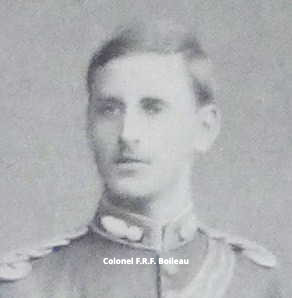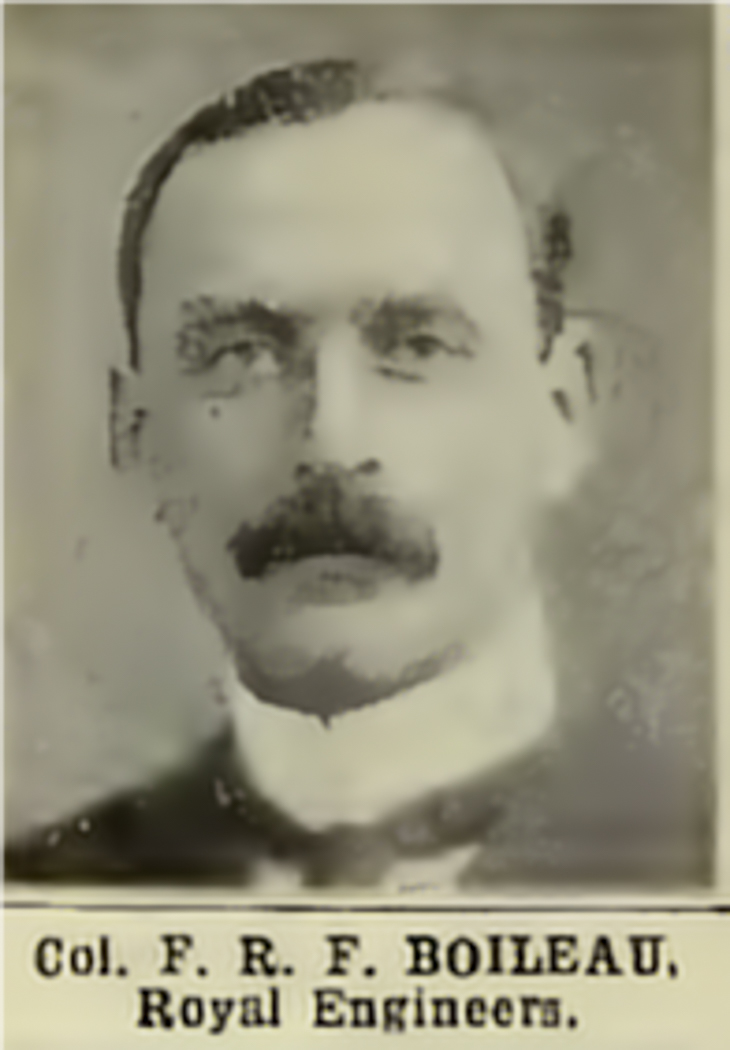Fallen in August 1914:
Frank Ridley Farrer Boileau
RIDLEY BOILEAU
Colonel
Royal Engineers
D.O.W. Thursday, 27th August 1914
Remembered with Honour, Terlincthun British Cemetery, Wimille Plot: XVI AB 1
Colonel Ridley Boileau is the highest-ranking soldier commemorated on the Hemel Hempstead War Memorial and of the men commemorated, he was one of the first to fall on 27th August 1914.
Frank Ridley Farrer Boileau was born in Lucknow, Bengal, India on 29th November 1867 to Colonel Francis William Boileau and his wife Mary Letitia. He was the fourth of nine children, and had four brothers and four sisters, whilst his father was on the Staff Corps of the Indian Army. Ridley was educated at Cheltenham College between 1882 and 1885 and was gazetted 2nd Lieutenant Royal Engineers on 16th February 1887.
As a professional soldier he saw active service in India serving in operations as part of the Lushai and Chitral Expeditions during 1892 and 1895. He also served in the Second Boer War and was mentioned in Despatches by Lord Roberts in 1900 following action at Zilikat’s Nek. From May 1902 Ridley transferred to Headquarters as Deputy Assistant Adjutant General R.E. where he served until March 1906. He then took up a position as Professor at the Indian Staff College, Quetta, India, before being appointed General Staff Officer, 1st Grade, 3rdDivision, Southern Command in January 1910. He had moved through the ranks during this time finally being promoted Colonel on 21st January 1910.
As Brevet Major on Army Headquarters Staff, Ridley took part in the coronation of Edward VII on 9th August 1902 in the ‘The King’s Procession’, a little way in front of the State Coach. He was part of a ‘State Parade’ which comprised some 1,300 officers, 23,500 other ranks, 2,000 bandsmen and drummers, 4,100 horses and 34 guns, as well as statesmen, politicians, and dignitaries from all corners of the British Empire.
Away from his soldiering Ridley was elected as a fellow of the Huguenot Society at the Windsor Hotel, Victoria Street, Westminster on 10th November 1897. He was living at ‘Elstowe’ in Camberley at that time. In January 1902 he married Mary Aurora Tudor at the parish church of Lustleigh in Devon; his father-in-law ‘to be’ conducted the ceremony. He and Mary had three sons Etienne, Peter and finally Hugh.
When war broke out, Ridley was posted with the British Expeditionary Force in France, disembarking in August 1914. He was CSO 1st Grade, 3rd Division with General Smith-Dorrien’s II Corps at the battles of Mons and Le Cateau. Famously the battle of Le Cateau, which took place on the 26th August 1914, is seen as critical in saving the BEF which was in retreat from Mons. As well as checking the German advance and delaying their Schlieffen timetable, the II Corps inflicted heavy casualties on the enemy. However, II Corps faced seemingly overwhelming odds and experienced heavy and unrelenting punishment from German artillery. In its stand it suffered more than 7,800 casualties from a complement of 68,000 troops. Additionally, the Corps lost 38 guns. Whilst the German casualties were not disclosed there may have been as many as 15,000 from a force of approximately 160,000 men.
Ridley died on Thursday, 27th August 1914 less than a month after the outbreak of war. He succumbed in hospital in Boulogne the day after self-inflicted gunshot wounds. Subsequent records state that Colonel Boileau "went off his head" and shot himself following Le Cateau and died later in hospital. Many reports at the time described the level of stress and fatigue prevalent amongst the men of the B.E.F. and indeed, General Smith-Dorrien himself expressed concerns in a diary note on 28th August stating: "some of the Staffs of Brigades and Divisions are quite worn out and quite unequal to working out orders". It is reported that other senior officers also collapsed following Mons and Le Cateau from exhaustion and there were other reported suicides.
Ridley's death was reported in the Gloucestershire Echo on 21st September 1914.
It is not clear why Ridley Boileau was included amongst the names of the fallen on the Hemel Hempstead War Memorial. No evidence has come to light during research linking him to the town or to anyone living and working in Hemel before or during the Great War. Indeed, almost all records refer to him as ‘Frank’ rather than ‘Ridley’ as recorded on the memorial. A search of the available records reveals only four other soldiers with the surname Boileau who died during the conflict. None has a name similar to Frank or Ridley or any name which could be easily confused.
A young Col. F. R. F. Boileau (Photo: IWM - Bond of Sacrifice, First World War Portraits Collection)
Col. F. R. F. Boileau (Photo: The War Illustrated Album Deluxe, Ed. J.A. Hammerton, Amalgamated Press Ltd, London, 1915)
His close association with General Smith-Dorrien, a native of Berkhamsted, may be a reason for his inclusion or there may be some association with the Smeathman family from Hemel Hempstead. Julian Smeathman was a career soldier who also served as an officer in the Royal Engineers and fought with the B.E.F. in Flanders. Ridley’s inclusion may have been proposed by Julian’s elder brother Lieutenant-Colonel Lovel Smeathman, who played a significant role in the commissioning of the Hemel Hempstead War Memorial, as an act of remembrance for his dead brother’s fellow officer.
Colonel Frank Ridley Farrer Boileau is commemorated on the War Memorial in Lustleigh, Teignbridge, Devon and on a memorial tablet in St John the Baptist Church, Lustleigh. The inscription reads:
"IN LOVING MEMORY OF FRANK RIDLEY FARRER BOILEAU, COLONEL GENERAL STAFF BORN 29 NOVEMBER 1867. DIED FOR HIS COUNTRY AT HAM FRANCE 27 AUGUST 1914 ALSO OF MARY AURORA HIS WIFE BORN 4 DECEMBER 1874 DIED 20 JULY 1958
AMAVIMUS AMAMUS AMABIMUS"
Ridley is also commemorated on the Frimley and Camberley war memorial in Berkshire. He was originally buried at Ham Communal Cemetery in France, but he was exhumed by Commonwealth War Graves Commission (CWGC) in June 1968 and re-interred at Terlincthun British Cemetery, Wimille Plot: XVI AB 1. Ridley Boileau was 47 years of age when he fell.
He was eligible for the 1914-15 Star, the British War Medal and the Allied Victory Medal.

